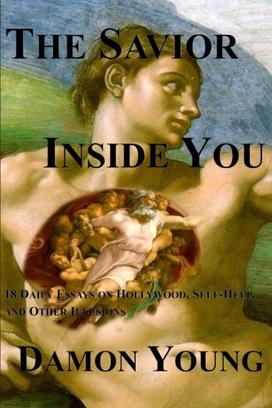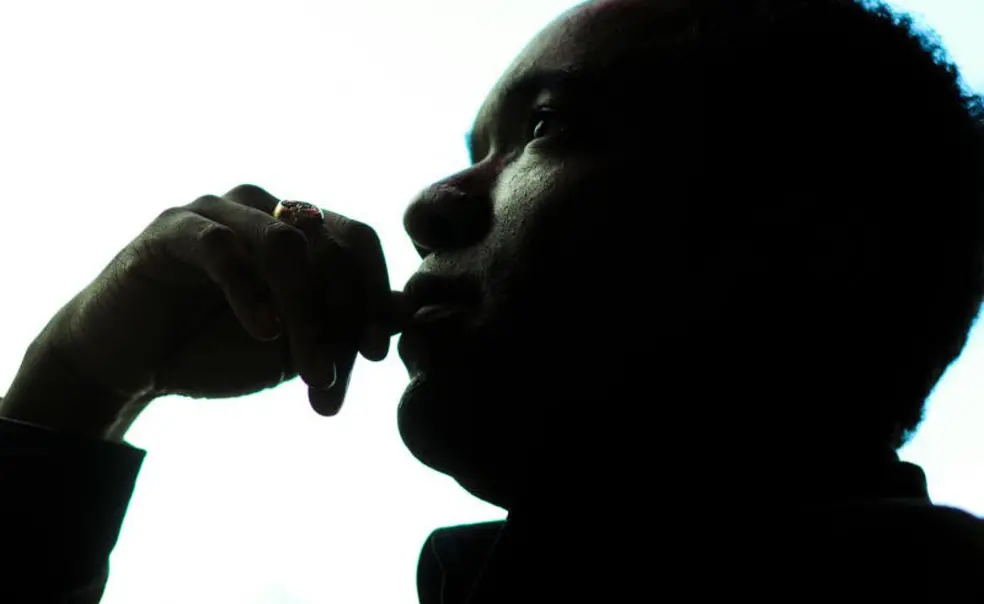Damon Young ’95 Reflects on Life and Happiness in ‘The Savior Inside You’
The Book: The Savior Inside You (CreateSpace) is a collection of 18 essays that reflect on various aspects of author Damon Young ’95’s journey to Los Angeles, California. After 15 years of chasing his dream to work in movies, Young offers his two cents on love, life, money, fame, and other topics that have emerged during his journey. The Savior Inside You challenges readers to dig deep and reflect on themselves.

The Author: A native of Baltimore, Maryland, Damon Young ’95 earned his undergraduate degree in computer science and began his career as an IT consultant. After a change of heart, he decided to change course and pursue his creative passions. He went on to earn his master’s in screenwriting from the American Film Institute. Young is the author of several books including Nite-Lite and The Takers.
Excerpt:
Day 2 of 18 - Facility
I live in Los Angeles, which, I’m guessing, is the intergalactic capital of self-help. Millions of people come here year after year after year in hopes of escaping their identities and realities so that they can graduate into someone else. If I were to be totally honest with you, I’d have to admit that I am one of them.
I left a very lucrative career in business technology consulting back in New York in the late ’90s because I was unhappy with the path I saw my life taking. I remember very distinctly watching The Matrix for the first time about a month before I confirmed that I was actually going to take the leap, quit my job, and come to LA to make movies. There’s a moment very early in the film, before Neo takes the Red Pill, where he’s being driven to meet Morpheus for the first time and he wants to get out of the car because he’s being asked to strip at gunpoint. He opens the door to the car and stares down a rain-soaked alley just as Trinity puts her hand on his shoulder to stop him.
“You know that road. You know exactly where it ends.”
That basically summed up how I felt at the time about my life. I’d had a moment two years before where I found myself staggering through Time Square, going into a complete downward spiral, thinking “I’m going to end up in some house, married to some woman, working at some job”, and the sheer banality of it all was just soul-crushing.
A few years before that, I’d been chatting in a cubicle with a co-worker, both of us fresh out of college and living the perks and the pains of the Big 6 neophytes that we were. He said, “Yeah, I’ll probably settle down and get married someday. Buy a house. Get a pretty good job.” And he smiled, content that those three accomplishments constituted the end-all and be-all of existence.
Inside, I was screaming “IS THAT ALL YOU WANT?!?!?”
It’s easy to lay the blame at the foot of a lifetime of elevated expectations, but we all have to admit that there’s a point where what Mom & Dad may want for us isn’t really a valid excuse anymore.
It was me. I wanted more. It wasn’t enough to have an Ivy League degree, working for one of the best firms in the industry in one of the most iconic cities in the world in the midst of its ’90s renaissance.
And by “more”, I didn’t really mean money. I was compensated pretty well, with the promise of even bigger bucks just over the horizon if I stayed the path.
And, hard though it may be to believe, “more” wasn’t really about being famous, per se.
You see, that’s the difference between those who come to Hollywood as actors, as opposed to those who come to Hollywood as auteurs.
“Auteur” is French for “author”, and it’s a term that grew out of the film theory & criticism circles in Europe in the ’50s.
Actors, at least, the good ones, want to disappear inside of some other identity, inhabiting some other reality.
Auteurs - those filmmakers whose presumed influence over every creative aspect of the finished filmed product leads many to believe that, despite all of the other artisans who bring their craftsmanship to a shoot, they are, in fact, the sole author of the product - want to create the world where the characters, and the audience inhabit and traverse.
Actors want to be someone else.
Auteurs want to be God.
There. I said it.
Most wouldn’t put it into such stark terms, but, what else do you call the person who determines your reality, who defines your history and your future, who determines whether you live or die and whether either alternative has any meaning relative to his or her own sensibilities and preferences? What else do you call the person who can judge whether you deserve what you get?
Ultimately, this is what all storytellers do with the characters in their stories. But filmmakers take it one step further.
If I’m an author, the world and the people inside of it live inside my mind. My story is an attempt at telepathy, whereby I take what’s inside of my mind and insert it into yours, either by my speech or words on the printed page.
But if I’m an auteur, the images inside my mind are not enough. The words on the printed page are not enough. The images on a storyboard or artist’s rendition are not enough.
As an auteur, I want to meet those characters, even if it’s only through an actor who lends his or her body to this fictional entity for a time. As an auteur, I want to walk the streets of my imaginary neighborhoods. I want the screams of battle that have echoed over and over inside my skull to reverberate in my ear drums from a cast of thousands.
I’ve been a storyteller all my life. But somehow, filmmaking gave me this unspoken notion that I would be able to exert some control. I’d spent so much time in the imaginary world, through books, through comics, through television and movies. It was like Agent Cooper and Captain Kirk and David Addison and Clark Kent were just as real friends and neighbors as my schoolmates and relatives. Rationally, we know we can’t pack a bag, get in the car, and move to Twin Peaks. But maybe, if I can make my own Twin Peaks - the Twin Peaks I’ve imagined and populated with my own characters to tell my own stories – through the facsimile of reality that we call a film, where it’s a shared vision instead of just mine, maybe that’s the next best thing.
And, really, who wouldn’t want to trade Avengers Mansion or Tatooine or the bridge of The Enterprise for the wood-paneled basement of my parent’s three-bedroom duplex in working-class suburban Baltimore? Who wouldn’t want to trade being the scrawny kid who was just a little too eager to be right in class to ever be cool for being the master of a universe of my own making?
Who wouldn’t want to trade being me for being God?
Of course, that’s not what I said at the time. That’s definitely not what I told my parents, and it most certainly was not what I told myself.
Sometimes, the best lies we tell are the ones we tell to ourselves about ourselves. Lies that we’re only just too eager to believe.
So, we come to Los Angeles.
One of the things that’s been fascinating about the 15 years I’ve spent here is that I’ve met far more people from the Midwest and the American heartland here in L.A. than I ever did in New York. It’s like everyone has the notion that you can come to Los Angeles and be transformed, without realizing that it’s all an illusion.
Because I think the trick that most LA newbies miss is that they’re not the only people who came here to recreate themselves.
Every other actor, or writer, or director, or producer, or studio executive, or agent, or manager, or life coach, or guru, or cult leader, or demigod who inhabits this city came here to become someone else. And their transformation relies on having someone else believe who they say they now are.
If I’m an actor, I need someone else to say that they believe me when I say “I’m Hamlet.” I need them to believe it so much that they’ll give me an idol that appears to be made of pure gold (even though it’s just gilded) as a sign of their fidelity.
If I’m a filmmaker, I need someone else to say they believed my story, that it moved their hearts and that I, therefore, controlled those hearts, even if it were just for a moment.
If I’m a studio executive, I need the filmmakers and actors to believe that I hold the key to the worlds into which they wish to escape or conjure and that my tastes must be appeased.
If I’m in the business of self-help, then I need each and every one of those people to believe that the only way they can become who they desired through this long arduous journey is with my help. I need them to believe that their dreams hinge on my thoughts, my ideas, my advice, my voice, my presence.
I need them to believe that I am a necessary prerequisite for their dreams.
And, in that sense, the difference between the manager, the life coach and the demigod is often just a matter of degrees.
Excerpted from The Savior Inside You by Damon Young. Copyright © 2015. Reprinted with permission from the author.










No responses yet